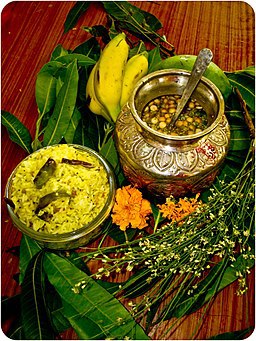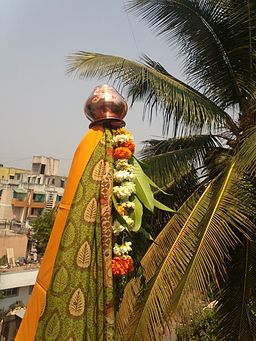Ugadi and Gudi Padwa
Ugadi and Gudi Padwa (Ugādi, Samvatsarādi, Yugadi, Gudi Padwa) mark the traditional New Year’s Day for the Hindus of Karnataka, Maharashtra, Andhra Pradesh, and Telangana states in India. It is festively observed in these regions on the first day of the Hindu lunisolar calendar month of Chaitra. This typically falls in late March or early April of the Gregorian calendar (March 18 2018, April 9 2019). The name Yugadi or Ugadi is derived from the Sanskrit words yuga (age) and ādi (beginning): “the beginning of a new age”. Yugadi or Ugadi falls on “Chaitra Shudhdha Paadyami” or the first day of the bright half of the Indian month of Chaitra.
Traditions of Ugadi
The day is observed by drawing colorful patterns on the floor called kolamulus (Kannada: Rangoli), mango leaf decorations on doors called toranalu (Kannada: Toranagalu), buying and giving gifts such as new clothes, giving charity to the poor, special bath followed by oil treatment, preparing and sharing a special food called Bevu Bella, and visiting Hindu temples. The Holige is a notable festive food that combines all flavors – sweet, sour, salty, bitter. In the Telugu and Kannada Hindu traditions, it is a symbolic reminder that one must expect all flavors of experiences in the coming new year and make the most of them.
Ugadi has been important and historic festival of the Hindus, with medieval texts and inscriptions recording major charitable donations to Hindu temples and community centers on this day. The same day is observed as a New Year by Hindus in many other parts of India. For example, it is called Gudi Padwa in Maharashtra, but sometimes observed a Gregorian day earlier because the lunar day starts and ends in Hindu calendar according to the position of the moon. In Karnataka, the festival is celebrated as Yugadi.
 Ugadi Pacchadi is a traditional dish made of new jaggery, raw mango pieces, coconut, neem flowers and new tamarind which reflect various tastes of life.
Ugadi Pacchadi is a traditional dish made of new jaggery, raw mango pieces, coconut, neem flowers and new tamarind which reflect various tastes of life.
Gudi Padwa Traditions
Gudhi Padwa is a spring-time festival that marks the traditional new year for Hindus in the state of Maharashtra. It is celebrated in and near Maharashtra on the first day of the Chaitra month to mark the beginning of the New year according to the lunisolar Hindu calendar. The word पाडवा (pāḍavā) or पाडवो (pāḍavo) or पड्ड्वा/पाड्ड्वो (pāḍḍavā/pāḍḍavo) comes from the Sanskrit word प्रतिपद (pratipada) or प्रतिपदा (pratipadā) in Sanskrit, which refers to the first day of a lunar fortnight. The festival is observed with colorful floor decorations called rangoli, a special Gudhi flag (garlanded with flowers, mango and neem leaves, topped with upturned silver or copper vessel), street processions, dancing and festive foods.
The festival is linked to the mythical day on which Hindu god Brahma created time and universe. To some, it commemorates the coronation of Rama in Ayodhya after his victory over evil Ravana, or alternatively the start of Shalivahan calendar after he defeated the Huns invasion in the 1st century. In rural Maharashtra, the festival is linked to Shiva’s dance, and the coming together of the community as they carry the Gudhi Kavads in a processional to a local Shiva temple.
 A traditional Gudhi (flag) decorated with flowers and neem leaves, topped with a silver pot
A traditional Gudhi (flag) decorated with flowers and neem leaves, topped with a silver pot
Sources: Wikipedia pages on Ugadi and Gudi Padwa
